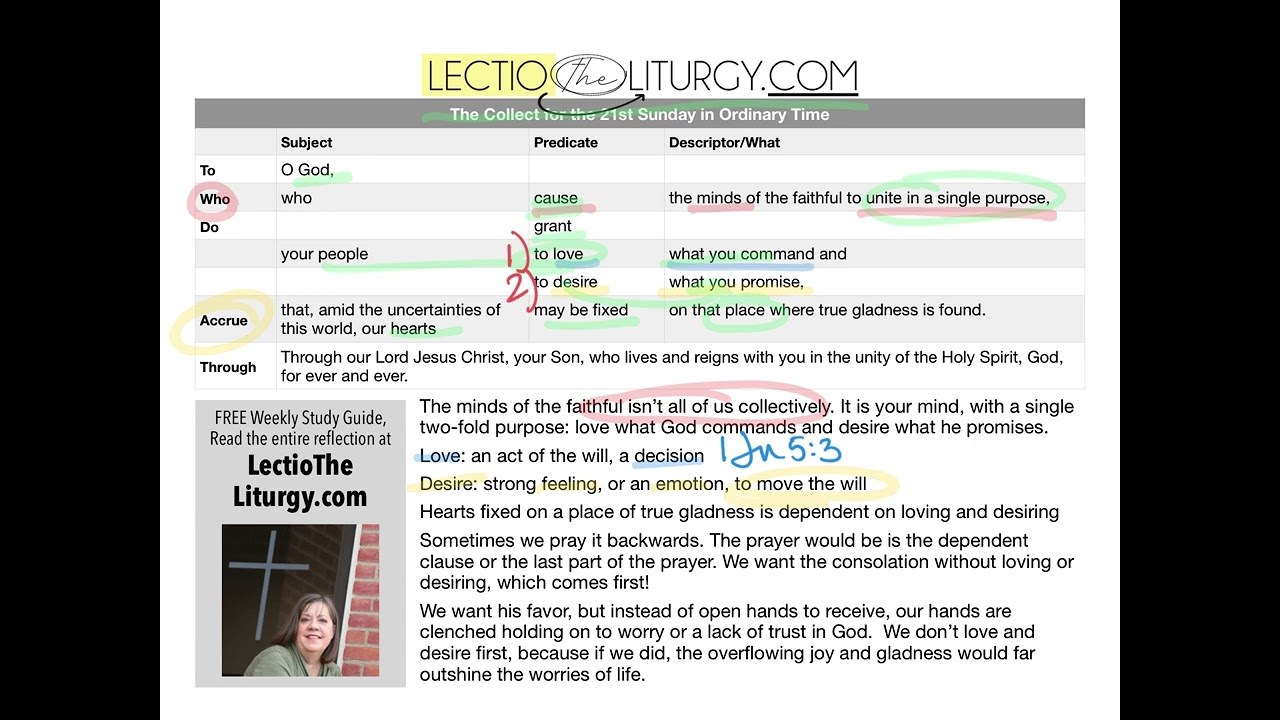Collect 21st Sunday in Ordinary Time
Thank you for joining me as we Lectio the Liturgy with the Collect for the 21st Sunday in Ordinary Time.
O God, who cause the minds of the faithful to unite in a single purpose, grant your people to love what you command and to desire what you promise, that, amid the uncertainties of this world, our hearts may be fixed on that place where true gladness is found. Through our Lord Jesus Christ, your Son, who lives and reigns with you in the unity of the Holy Spirit, God, for ever and ever.
This week’s prayer is a bit out of the ordinary. The “who” of this week’s prayer doesn’t give us a name or description of God or something he’s done. Instead, it tells us something that God wants to accomplish in the minds of his faithful: unite them to a single purpose. This is not about agreeing with one another, it’s not even about asking for peace on earth.
The prayer tells us that the single purpose that God wants to unite in the mind of each one of us is two-fold: the perfect balance of loving what God commands and desiring what he promises.
Those are some great verbs: love and desire.
Love is an act of the will. It’s a decision. We love God’s commands because we choose to. If that sounds difficult, remember that 1John 5:3 tells us that keeping God’s commands is not burdensome. How can that be? Because when we love God, we desire him, we desire to please him and we desire his promises.
Desire is defined as a strong feeling, or an emotion, that moves the will. We need to have a strong enough desire for something to make us willing to do what we need to do to get what we desire. What we desire should be something we love with true love.
The next part of the prayer is what I call the Accrue. It tells what the effect is, it is something we want to gain. It begins with the word that.
That (we may also see it in the prayer as “so that”) is a subjective conjunction, it joins a dependent phrase with an independent phrase. The dependent phrase is something that cannot stand on its own. It is only accomplished with the independent phrase.
Asking God to grant us love and desire can be a great prayer on its own. However, fixing our hearts on a place of true gladness isn’t possible because it is dependent on loving God’s commands and desiring his promises (the independent phrase).
As I was praying with this prayer, I was thinking about the times when I prayed backwards. My prayer would be is the dependent clause or the last part of the prayer. Amid the uncertainties, I would pray for peace and I would pray for God’s consolation, because things are falling apart in the world around me.
I had a sense that God was telling me that when sometimes when we pray, we forget that love and desire should be first. We come to him wanting his favor, but instead of open hands to receive, our hands are clenched holding on to worry or a lack of trust in God. We don’t love and desire first, because if we did, the overflowing joy and gladness would far outshine the worries of life.
